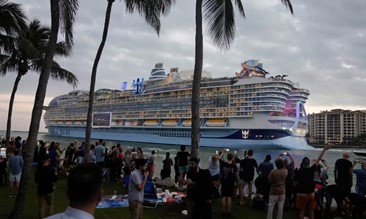
‘Cruisezilla' Ships Have Doubled in Size Since 2000, Environmental Campaigners Warn
New research reveals that "cruisezillas," massive passenger vessels, have significantly increased in size since the year 2000, raising concerns about their growing environmental impact as demand for ocean holidays continues to surge.
According to the campaign group Transport & Environment (T&E), the world's largest cruise ships have doubled in size since the turn of the millennium. If this trend continues unchecked, by 2050, the largest cruise ships could be eight times the size of the Titanic, which was the biggest ship on the seas before its ill-fated voyage over a century ago. Additionally, the number of cruise ships has increased 20-fold since 1970, highlighting the industry's rapid expansion.
"Today's cruisezillas make the Titanic look like a small fishing boat," said Inesa Ulichina, a sustainable shipping analyst at T&E.
Industry projections indicate that approximately 35 million passengers will set sail on cruise ships this year, marking a 6% increase from pre-pandemic levels. Analysts attribute this rise to growing global wealth. A study by JP Morgan in June reported that demand for cruises "remains robust," noting that the industry is now attracting a younger demographic, including millennials, beyond its traditional base of baby boomers.
However, the sector's large carbon footprint has raised alarm among experts working to mitigate its environmental impact. T&E's report found that in 2022, cruise ships emitted 17% more carbon dioxide compared to 2019, with methane emissions increasing by a staggering 500% over the same period.
Stefan Gössling, a professor at Linnaeus University in Sweden who specializes in tourism and climate issues, emphasized the environmental burden of cruise ships. He noted that while cruises represent a small portion of global tourism, they are among the most energy-intensive forms of travel, particularly when combined with flights to the departure point.
The report was released at a time when European ports are grappling with an influx of cruise ships during a summer marked by extreme heatwaves exacerbated by the climate crisis. As residents voice concerns over pollution and "overtourism," several ports have implemented measures to limit cruise ship activity. Barcelona, for example, plans to follow Amsterdam's lead by imposing a tax on cruise visitors, while Amsterdam has decided to close its central cruise terminal, a move that Barcelona also made in October. Venice has banned large cruise ships from entering its lagoon, which has been severely damaged.
Despite these challenges, the cruise industry continues to thrive. The world's largest cruise ship, the Icon of the Seas, was launched in January this year by Royal Caribbean. Built in Turku, Finland, this colossal vessel boasts 20 decks, 40 restaurants, seven swimming pools, a theatre, and a park. The 365-meter-long ship can accommodate nearly 10,000 people and is powered by liquefied natural gas (LNG), which produces less carbon dioxide than traditional marine fuels but contributes to global warming through methane emissions.
"This study highlights the risks posed by the expanding cruise entertainment industry," said Bryan Comer, head of the marine program at the International Council on Clean Transportation (ICCT).
Cruise ships face few engineering limitations regarding their size, apart from the constraints of the ports where they dock. As demand for luxury travel grows, operators have pursued economies of scale, resulting in increasingly larger vessels. The potential lifetime revenue from accommodating more passengers outweighs the cost of building bigger ships and hiring additional crew members, Comer explained. "Plus, everyone wants to have the biggest ship."
In 2000, the largest cruise ship was Royal Caribbean's Voyager of the Seas, with a gross tonnage (GT) of 137,276. Since then, the average size of the 10 largest ships has doubled, reaching 205,000 GT.
The Cruise Lines International Association (CLIA), the industry's largest trade body, stated that the global cruise fleet is "more energy-efficient than ever," with average emissions per ship decreasing by 16% over the past five years. "Most cruise ships operating today, and those scheduled to be in service well into the next decade, are small to mid-size vessels," CLIA noted.
Similar to airplanes, large ships traveling long distances cannot operate on electricity due to the excessive weight of the batteries required. Experts recommend that these vessels transition from fossil fuels to cleaner alternatives, which can be synthetically produced using renewable energy.
The International Energy Agency (IEA) projects that by 2050, 44% of the energy required for international shipping will come from ammonia, followed by hydrogen (19%), biofuels (19%), and methanol (3%). Currently, these alternatives are not in use.
Given the scarcity of green "e-fuels," activists have criticized cruise ships and superyachts as wasteful luxuries that should be banned outright. Some have staged protests at ports in Spain, France, and the UK. Others argue that the cruise industry, given its financial strength, should lead the way in spurring much-needed investment in cleaner technologies.
While cruise lines may not have the capacity to build fuel plants themselves, they could commit to purchasing the products generated by these facilities, Gössling suggested. "However, we are talking about very large amounts that also require a corresponding expansion of renewable energy."
T&E has urged policymakers to establish no-cruise zones in fragile ecosystems and to implement stricter regulations for decarbonizing cruise ships compared to non-luxury vessels. The group also proposed a global tax on cruise tickets to fund efforts in developing countries to clean their economies.
Royal Caribbean did not immediately respond to a request for comment.